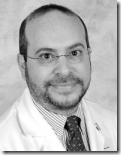The article about Pediatric Associates in CA has a nugget with a potentially outsized impact: the implication that VFC vaccines…
Joel Diamond 9/14/09
Random Thoughts from a Traveling Physician
Maintaining a private primary care practice while being a healthcare executive for an international company is both rewarding and challenging. Travel and interaction with doctors and nurses in diverse environments is extremely valuable in gaining new perspectives on healthcare, but often requires creative processes to remain accessible to my patients back home.
A few weeks ago, I was waiting on line to board an airplane in Pittsburgh. By chance, several of my patients were on the flight. One reluctantly told me that he felt guilty about not scheduling his overdue colonoscopy and another mentioned his need for prostate exam. A stranger who was in line, actually asked me if I “enjoyed doing that kind of thing” and should he be” nervous” with his own doctor. I couldn’t help but reinforce his anxiety by saying, “Only if you feel both of his hands on your shoulders during the examination”.
When I finally took my seat, the gentleman next to me said, “I couldn’t help hearing those people talk to you. It must be strange running into patients like that.” Thinking that this was going to turn into a conversation about accessibility and dedication, I was disappointed to hear his next question. “How does it feel when people see you and only think about their ass?” Oh well, so much for the glamour of a traveling physician.
On a recent trip to the Netherlands, I took my 16-year-old son with me, hoping to enrich him culturally. Unfortunately, our brief stroll through Amsterdam’s famed Red Light District became the prime focus of discussion when talking to his friends back home. My wife still quizzes him about details of the Anne Frank House and Reikmuseum just to see if we really did doing anything truly cultural.
The truth is that one must turn every situation into a meaningful learning platform for teenagers. For instance, when my son noticed a leather-clad prostitute wearing a dog collar casually sitting in her shop front window, I seized the opportunity to point out that she paid income tax on her earnings along with a 19% VAT on each client. (Annoyingly, he challenged her clients’ ability to maintain invoices for services). Undaunted, I persisted by launching into a discussion about Dutch healthcare. I pointed out that, like all Dutch citizens, she is covered under a universal healthcare policy that she pays for by both private payments and taxes.
All joking aside, Jonathan Cohn, a senior editor at The New Republic, wrote recently about satisfaction with universal healthcare in Holland. His observations align perfectly with my own. He points out that in Holland, most people have long-standing relationships with their primary care doctors, and 60% of them can get a same-day appointment (compared to the US, where it is only 26%). And while the Dutch spend only 10% of their GDP on healthcare, they rank substantially higher than the US in several key indicators of health.
This really got me thinking about the whole issue of accessibility in heathcare. While walking along Amsterdam’s beautiful canals, I was actually interrupted twice by patient calls from back home. It was bit surreal to e-prescribe on my BlackBerry while so far away. Clearly technology, if used properly, is a key to patient-physician accessibility. Having access to my patients’ records through an EMR plus interoperability with the hospital IT system allows me to care for patients even during travel, but it is my patients’ access to my cell phone that makes them feel that I am always available to them.
Now I know what you’re probably thinking — “access to cell phone!?” Yes, I know … this is not the norm, but it is precisely why my patients can tolerate my unusual schedule. As is the case with the Dutch, the issue of accessibility should not necessarily be a detriment of universal healthcare, but attitudes and processes must be creatively changed, much like in my own practice.
Flying home recently, a complete stranger sitting next to me was complaining about his elbow. It was red and swollen and I casually asked him if he was going to get it taken care of immediately when he landed. “Should I?” he asked. I told him that he had a fairly significant olecranon bursitis and it appeared infected. I explained that it would likely require drainage of the fluid plus antibiotics. He thanked me for the advice, but then looked at me and asked reluctantly, “I didn’t think to ask, but without insulting you … you are a doctor, aren’t you?” With a straight face I answered, “No, but I did stay at a Holiday Inn Express last night”.

Joel Diamond, MD is chief medical officer at dbMotion, adjunct associate professor at the Department of Biomedical Informatics at the University of Pittsburgh, and a practicing physician at UPMC and of the Handelsman Family Practice in Pittsburgh, PA. He also blogs on interoperability.
